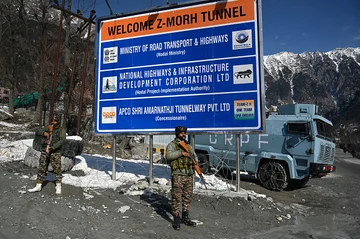
The inauguration of the Z Morh Tunnel, renamed the Sonamarg Tunnel by Prime Minister Narendra Modi on January 13, marks a significant milestone in ensuring year-round connectivity to the scenic town of Sonamarg. Once the Zojila Tunnel, originating from Sonamarg, is completed, it will provide uninterrupted access to Ladakh throughout the year. This infrastructure development has gained considerable importance following the Galwan Valley clashes between Indian and Chinese forces in June 2020.
The confrontation in 2020, which involved hand-to-hand combat in Ladakh’s Galwan Valley, resulted in the loss of 20 Indian soldiers. In the aftermath, the Indian government ramped up investments in infrastructure along the Line of Actual Control (LAC) in Ladakh. Key projects, including the Z Morh and Zojila tunnels, were prioritized to provide all-weather access to Ladakh, a region often cut off for six months due to severe winters. Both the Srinagar-Leh Highway and the Manali-Leh Highway remain inaccessible during the colder months because of harsh weather conditions.
According to official sources, the Sonamarg Tunnel project was constructed at an estimated cost of over ₹2,700 crore. The project includes a 6.4-kilometer-long main tunnel, an egress tunnel, and approach roads. Situated at an altitude exceeding 8,650 feet above sea level, the tunnel bypasses areas prone to landslides and avalanches, ensuring safer and more reliable connectivity between Srinagar and Sonamarg en route to Leh. This vital project addresses the challenges of inaccessibility during winter months. A government spokesperson highlighted that alongside the Zojila Tunnel, set for completion by 2028, the Sonamarg Tunnel will shorten the route length from 49 kilometers to 43 kilometers and increase vehicle speeds from 30 km/h to 70 km/h. This improvement will facilitate seamless NH-1 connectivity between Srinagar Valley and Ladakh, enhancing defense logistics, economic growth, and socio-cultural integration across Jammu and Kashmir and Ladakh.
Harpal Singh, Chief Operating Officer of Megha Engineering, the firm constructing the Zojila Tunnel, described the Sonamarg Tunnel as transformative for the region. “This tunnel, previously known as the Z-Morh Tunnel and dedicated to the nation by Prime Minister Modi, is a game-changer for Sonamarg,” he said.
However, Singh noted that Ladakh residents will continue to face connectivity challenges during winter until the Zojila Tunnel is completed, which is expected by December 2027. He added that approximately 1,200 workers, most of whom are from Jammu and Kashmir, are laboring under extreme weather conditions, with temperatures plummeting to minus 32 degrees Celsius, to make this ambitious project a reality.
Tragically, on October 20, 2024, militants attacked a workers’ camp at Gagangir, where employees working on the Z Morh Tunnel were housed. The assault resulted in the death of seven individuals, including six non-local workers and a local doctor from Kashmir.
During the tunnel’s inauguration, Prime Minister Modi paid tribute to the workers who lost their lives, stating, “Seven of our comrades made the ultimate sacrifice, but their determination and resilience never faltered. None of them wanted to abandon the project. They bravely faced all challenges and accomplished this monumental task.” Reflecting on the sacrifices, he said, “On this beautiful snowy day, my thoughts are with the seven brave souls we have lost.”
Chief Minister Omar Abdullah also acknowledged the fallen workers, emphasizing that their sacrifices serve as a reminder that those opposing progress, peace, and democracy in Jammu and Kashmir will ultimately fail. “The Prime Minister’s presence at this inauguration demonstrates that such attacks will not deter us. Those who seek to disrupt peace and development will always face defeat here,” he stated.
